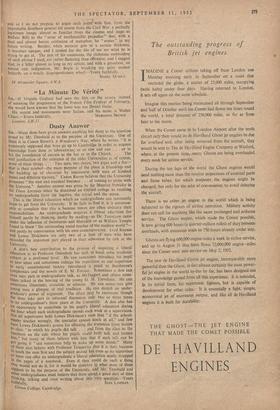Dusty Answer
SIR,--Many dons have given answers anything but dusty to the question Posed by Mr. Theobald as to the purpose of the University. One of them is in Canon Raven's A Wanderer's Way, where he writes, "It is commonly supposed that boys go up to Cambridge in order to acquire knowledge from dons or laboratories; or to row and run . . . or to lay the foundation of success at the bar or in the Church. . . . The real justification of the existence of the older Universities is, of course, none of-these things.... Two men, two chairs, two pipes and a fire— that is their symbol—the main purpose of the place is friendship and the building up of character by intercourse with men of kindred tastes and different training." Canon Raven believes that the University Promotes " the vast and essential business . . . of coming to terms with the Universe." Another answer was given by Sir Maurice Powicke in his Three Lectures when he described an Oxford college as recalling an undergraduate from the fugitive, the trivial and the mean.
This is the liberal education which an undergraduate can reasonably hope to get from the University. If he fails to find it, it is unreason- able to complain that this is because tutors too often abdicate their responsibilities. An undergraduate acquires a liberal edu:ation for himself partly by thinking, partly by reading—as Dr. Trevelyan came under the influence of Swinhurne and Meredith or as William Temple found in Shaw " the outstanding social teacher of the modern world "- and partly by conversation with his own contemporaries. Lord Keynes and Lowes Dickinson are only two of a host of men who have recorded the important part played in their education by talk at the University. A don's best contribution to the process of acquiring a liberal education is, as Professor Oakeshott has said, tO teach some academic subject at a profound level. He can sometimes introduce his pupil to new ideas and sometimes enlarge his experience as one supervisor m early constitutional history introduced a pupil to Beethoven's symphonies and the novels of E. M. Forster. Sometimes a don can even take part in undergraduate talk, as McTaggart and others some- times talked in the hearing of the young G. M. Trevelyan. He can sometimes illuminate, stimulate or criticise. He can somet mes give Young men a glimpse of real erudition. He can stretch an under- graduate's power of argument. The effect may be enormous though the dons take part in informal discussion only two or three times, ltl an undergraduate's three years at the University. A don also has an opportunity to contribute to his pupil's liberal education during the hour which each undergraduate spends each week at a supervision. Not all supervisors hold Lowes Dickinson's view that " if the school- master teaches wrongly, the specialist cannot teach at all," and few have Lowes Dickinson's genius for effecting the transition from lecture to class " in which his pupils did talk . . ‘. and from the class to the luncheon on the side where his pupils could both talk and lecture Ilan," but many of them believe with him that if such talk can be got going it " can sometimes help to wake up some minds," Many of them also believe with Professor Temperley that it is their business 10 teach the man first Rad the subject second but even so no supervisor -9r tutor can offer an undergraduatd a liberal education neatly wrapped "9 the pages of a notebook. Even if they could do such a thing "neY would not do it, for it would be contrary to what most of them suppose to be the purpose of the University, and Mr. Theobald and other undergraduates must believe that dons spend a good deal of time thinking, inking, talking and even writing about this very question.—Yours


































 Previous page
Previous page